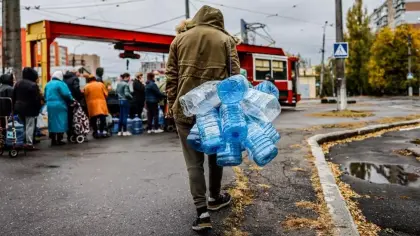Homes in Mykolaiv, a city on the southern coast of Ukraine, have been without safe drinking water for six months, a recent BBC report claims. Residents have been forced to live in these conditions since the city’s water supply was shut off.
According to military and UN experts interviewed by the BBC, the pipeline to the city may have been purposefully destroyed while under Russian control last April, according to satellite images and data.
JOIN US ON TELEGRAM
Follow our coverage of the war on the @Kyivpost_official.
International humanitarian law is generally regarded as being broken when resources necessary for civilian life are destroyed. However, Russia has intensified its attacks on Ukraine’s water and power infrastructure in recent days, causing shortages all over the nation.
The city of Mykolaiv is close to the military front and frequently shelled, making it risky to stand in a line to collect clean drinking water. It has been under Ukrainian control ever since Russia invaded.
A Ukrainian news outlet published some images in April 2022 that it claimed showed damage to the only water supply pipeline for Mykolaiv caused by Russian forces. The report states that the BBC has examined images from social media and satellite networks to support this assertion.
It demonstrates that the pipeline’s weakest point, where it emerges from the ground, was where it was damaged.
The pipeline leaked after it was broken on April 12 for about eight hours, losing an estimated 40 million liters of water, before the supply to it was cut off, a source in Mykolaiv revealed to the BBC.

EU Transfers €1.5 Bln Raised From Russian Assets for Ukraine
The report also describes that the water from the leak should have flowed south of the pipeline, according to an analysis of the local topography.
An image from the messaging app Telegram that was geolocated by the BBC and used in the BBC article reveals that a region in the projected flooding’s route was in fact completely flooded by water.
In addition to proving that this pipeline segment was damaged, the BBC report states that it also discovered satellite photographs that showed Russian military nearby.
When Vitaly Kim, the governor of Mykolaiv, told the BBC that the region was in Russian hands, four tanks were visible in the picture from the BBC report close to the pipe. He claims that although there were plans to fix the pipeline, they were unable to proceed because it was “an active military position.”
According to the report, the BBC also met Dmytro Butrii, who was the Kherson region’s exiled governor at the time, in a covert location. He provided more information about the attempts to fix the pipeline, saying “there were negotiations [with the Russians] conducted by the authorities in Mykolaiv” but occupying forces “did not allow the repair team to access the site.”
In order to determine whether the pipe was harmed by accidental shelling or deliberate sabotage, the BBC report showed the satellite images and the open source images of the pipe to a security expert.
Chris Cobb Smith, a specialist in military forensics who spent more than 20 years as an artillery officer in the British Army and three years as a UN weapons inspector in Iraq, offered his opinion on the predicament to the BBC:
“The chance that this was the result of one stray round is infinitesimal, and extremely unlikely that it was a result of an intended indirect fire strike.”
As there are no obvious holes nearby, he doesn’t think it was created by shells fired by tanks.
“I believe the destruction was caused by the intentional placement of an explosive charge either directly under the pipe or possibly on top of it, at the most vulnerable point.”
Marco Sassli, a professor of humanitarian law at Geneva University, concurs. He was dispatched to Ukraine as a member of the Organization for Security and Cooperation in Europe’s (OSCE) fact-finding team of specialists to document human rights abuses after the Russian incursion. Sassli remarked, “This certainly shows a violation of international humanitarian law. Destruction of objects indispensable to the survival of the civilian population is prohibited.”
Following Ukraine’s latest counterattack against Russian forces, the front line near to the broken pipeline has moved back and forth, giving residents of Mykolaiv hope that the pipeline would soon be rebuilt.
However, the report reveals that the BBC visited the city once more in the weeks after the onslaught began and, as winter drew near, reporters encountered old people who were waiting in line for clean water and humanitarian aid.
Before the engineers can repair the damaged sections, according to Mykolaiv officials, the area close to the pipeline must be defended and protected from Russian artillery strikes. The report concludes It’s unclear when this might occur or when city residents will once again have access to clean running water in their homes.
You can also highlight the text and press Ctrl + Enter






